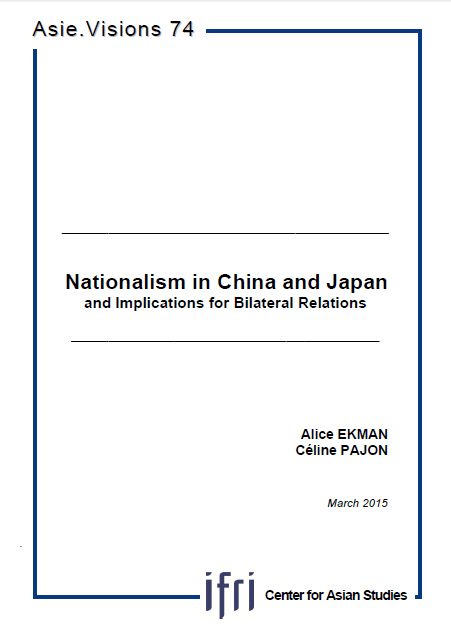Nationalism in China and Japan and Implications for Bilateral Relations

Nationalism appears to be an important part of the growing frictions between China and Japan.
In Japan, the return to power of Shinzo Abe as prime minister, and the historic breakthrough of an extreme right-wing party onto the political scene reinforce the view that there has been a clear shift to the right. Public opinion is today also more realistic about direct security threats to Japan.
However, this rise in neo-nationalism, which contains a clear anti-Chinese strain, should not be caricatured as aggressive militarism. Furthermore, it is strongly contained by democratic safeguards.
In China, the new leadership headed by Xi Jinping has promoted patriotic and nationalist ideas even more strongly than its predecessors, while still concentrating on the traditional aims of economic development and stability. Under these circumstances, the exploitation of anti-Japanese nationalism by the Party should not be overestimated: it is tolerated to a certain degree, but controlled and even repressed as soon as it risks getting out of hand.
Nationalism is thus one aspect, among others, of Chinese and Japanese foreign policy. Other key factors need to be taken into account, which may either moderate or exacerbate it. Measures controlling nationalism are in place, though they have shown themselves to be moderately effective in the face of the radicalization and sharpened sensitivity of public opinion. The acceleration of phases of nationalism along with provocations is coalescing with increasingly antagonistic views so as to reinforce security dilemmas. In fact, tensions today appear to be so strong that they have reached a point of no return. This makes it impossible to restore the status quo ante or to establish some form of reconciliation on new grounds.
Alice Ekman is a research fellow at the Center of Asian Studies (Ifri), and a China specialist. She is also teaching at Sciences Po Paris.
Céline Pajon is a research fellow at the Center of Asian Studies (Ifri), and a Japan specialist.
Download the full analysis
This page contains only a summary of our work. If you would like to have access to all the information from our research on the subject, you can download the full version in PDF format.
Nationalism in China and Japan and Implications for Bilateral Relations
Related centers and programs
Discover our other research centers and programsFind out more
Discover all our analysesJapan’s Takaichi Landslide: A New Face of Power
Prime Minister Sanae Takaichi has turned her exceptional popularity into a historic political victory. The snap elections of February 8 delivered an overwhelming majority for the Liberal Democratic Party (LDP), driven by strong support from young voters, drawn to her iconoclastic and dynamic image, and from conservative voters reassured by her vision of national assertiveness. This popularity lays the foundation for an ambitious strategy on both the domestic and international fronts.
The U.S. Policy Toward Taiwan Beyond Donald Trump: Mapping the American Stakeholders of U.S.-Taiwan Relations
Donald Trump’s return to the White House reintroduced acute uncertainty into the security commitment of the United States (U.S.) to Taiwan. Unlike President Joe Biden, who repeatedly stated the determination to defend Taiwan, President Trump refrains from commenting on the hypothetical U.S. response in the context of a cross-Strait crisis.

China’s Strategy Toward Pacific Island countries: Countering Taiwan and Western Influence
Over the past decade, China has deployed a diplomatic strategy toward the Pacific Island Countries (PICs). This strategy pursues two main objectives: countering Taiwan's diplomatic influence in the region and countering the influence of liberal democracies in what Beijing refers to as the "Global South."

Opening up the G7 to South Korea to Address Contemporary Global Challenges
The G7’s global influence has diminished as powers like China reshape international governance through initiatives such as BRICS and the Shanghai Cooperation Organisation (SCO). With the G7 now representing just 10 per cent of the world’s population and 28 per cent of global GDP, its relevance is increasingly questioned.














